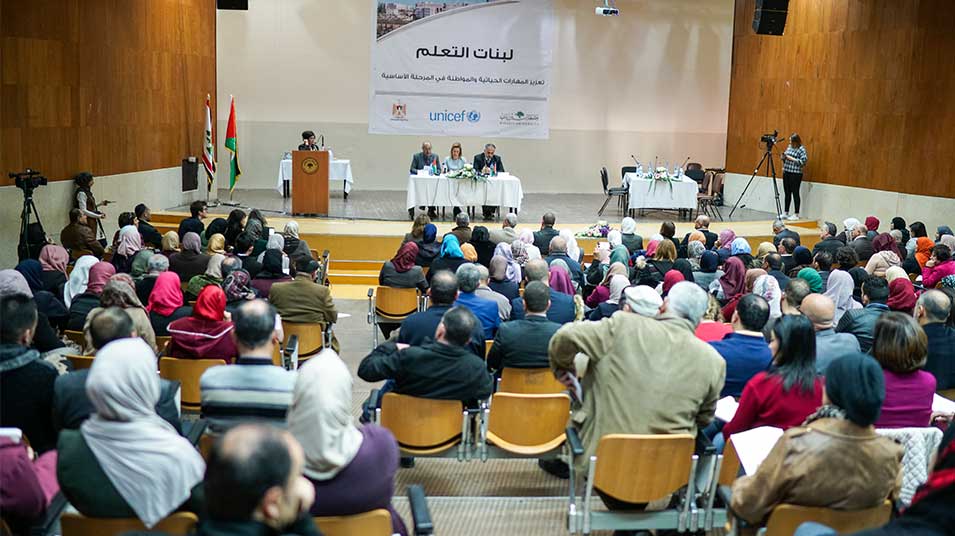Center for Continuing Education launches Experiential Learning Objects
The Center for Continuing Education at Birzeit University, in cooperation with the Ministry of Education and Higher Education and UNICEF, launched the first phase of the Experiential Learning Objects (xLOBs) for grades 1 through 4 in a symposium entitled, “Integrating Life-Skills and Citizenship Education into Basic Educational Systems.” The symposium, which aims to create an interactive, participatory learning environment, was held on February 7, 2018.
Attending the symposium were Vice President for Academic Affairs Dr. Faisal Awadallah; Ministry of Education and Higher Education Undersecretary Dr. Basri Saleh; UN Special Representative in Palestine Genevieve Boutin; Ministry of Education and Higher Education Director General of National Institute for Educational Training Dr. Shahnaz Far; Director of the Unit for Learning Innovation at the Center for Continuing Education Dr. Osama Mimi; a group of directors from the Ministry of Education and Higher Education; and a number of teachers, instructors, and Birzeit University faculty members.
Dr. Saleh expressed the Ministry of Education’s pride in the project, citing the joint efforts of teams from Birzeit University, UNICEF, and the ministry as reasons for the project’s great success. He said, “We have to create a sense of civil partnership and harmony with local and international partners to ensure adequate support and development for the education sector and to counter the unending violations and restrictions of the Israeli occupation, which aims to deny Palestinian children of their right to education.”
Dr. Awadallah confirmed Birzeit University’s full commitment to the established partnerships with all Palestinian institutions to achieve and implement any projects or plans that aim to develop the Palestinian community and its institutions. He also thanked the Ministry of Education and Higher Education and UNICEF for their efforts and confirmed the university’s readiness to employ all its scientific, academic, and technical expertise.
“We affirm the partnership model between the various institutions that planned, designed, implemented, managed, evaluated, or funded the project. It is an effective model that can be modeled by all institutions which wish to implement a successful partnership between the public sector and academic institutions,” said Dr. Awadallah.
Boutin reiterated UNICEF’s dedication to the children of Palestine and their right to education. She said, “It’s my privilege to be here in this symposium among those who helped make this program a reality. It is of the essence that we provide the two million children in Palestine the skills and tools that they need to build their futures as well as the future of this nation, and this is why we at the UN have prioritized this program and have given it our full attention.”
“The skills and knowledge currently being taught in schools,” added Genevieve, “don’t correspond to the market’s need and future prospects. This program, however, proposes well-thought-out methods of establishing these ideas and teaching these skills. It is a powerful tool to positively impact the children’s future, and it serves as a pioneering model for the region to follow.”
Mimi reviewed the role of the Experiential Learning Objects in improving the quality of primary education. “Experiential Learning Objects are the result of 14 years of planning and research and will constitute the core for the development of a national portal of learning objects for all stages of the education process. This project will not only benefit us here in Palestine but it can be also be exported and applied regionally.”
Director of the Center for Continuing Education Marwan Tarazi explored the inner mechanics of the project and its prospects, and author and researcher Malik Rimawi presented a study of the effect of the Experiential Learning Objects on teaching practices and student performance in primary education.
The symposium also featured two roundtable discussions. The first, “Learning Objects in a Scientific Context,” was facilitated by Dr. Nader Wahbeh and attended by Dr. Shahnaz Far, Dr. Osama Mimi, Malik Rimawi, and Maurice Backleh.
The second session, “The Experience of Applying Learning Objects in Palestinian Schools,” was chaired by Dr. Shahnaz Far and attended by Vivian Tanous and a number of school principals, supervisors, and teachers.
During the symposium, CCE and its partners showed a film which highlighted the efforts of Birzeit University and the Ministry of Education and Higher Education’s teams, as well as the process of utilizing Learning Objects in classrooms.







